初中英语介词专项讲解及练习(人教版)
初中英语介词专项讲解及练习(包含答案)
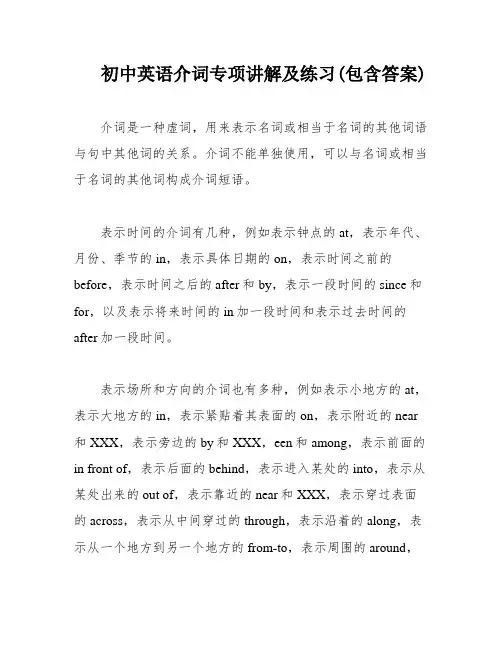
初中英语介词专项讲解及练习(包含答案)介词是一种虚词,用来表示名词或相当于名词的其他词语与句中其他词的关系。
介词不能单独使用,可以与名词或相当于名词的其他词构成介词短语。
表示时间的介词有几种,例如表示钟点的at,表示年代、月份、季节的in,表示具体日期的on,表示时间之前的before,表示时间之后的after和by,表示一段时间的since和for,以及表示将来时间的in加一段时间和表示过去时间的after加一段时间。
表示场所和方向的介词也有多种,例如表示小地方的at,表示大地方的in,表示紧贴着其表面的on,表示附近的near和XXX,表示旁边的by和XXX,een和among,表示前面的in front of,表示后面的behind,表示进入某处的into,表示从某处出来的out of,表示靠近的near和XXX,表示穿过表面的across,表示从中间穿过的through,表示沿着的along,表示从一个地方到另一个地方的from-to,表示周围的around,表示正上方的over,表示正下方的under,表示斜上方的above,表示斜下方的below。
介词的使用需要根据具体情况来判断,掌握介词的用法可以帮助我们更准确地表达自己的意思。
In using a language。
it'XXX to know about the culture and customs of the people you are XXX my experience。
as someone who has lived in different countries。
it's important to adapt and be respectful。
just like you would in your own country.With the right clothing and knowledge。
you can XXX。
人教版中考英语专项训练初中英语介词X知识点总结含答案解析

人教版中考英语专项训练初中英语介词X知识点总结含答案解析一、初中英语介词1.—I'm thirsty. I'd like a glass of orange juice. What about you, Andy?—I prefer a cup of tea ______ nothing in it.A. withB. forC. toD. without【答案】 A【解析】【分析】句意:——我渴了。
我想要一杯橙汁。
你呢,安迪?——我更想要一杯茶,什么都不加。
A. with 和,跟,带有;B. for 为,为了;C. to 向,朝着;D. without 没有。
根据nothing,可知是什么都不加,用with,表伴随,故选A。
【点评】考查介词辨析。
注意区分不同介词的用法。
2.We will attend the junior high graduation ceremony ________ June 21st, 2019.A. inB. atC. on【答案】 C【解析】【分析】句意:在2019年6月21日我们将参加高中毕业典礼。
in用在年、月的名词前;介词at用在时间点前面,在具体的某个日期前用介词on,故选C。
【点评】此题考查介词用法。
掌握介词的使用规则。
3. , I found the job boring, but soon I got used to it.A. To start withB. First of allC. Without doubtD. After all【答案】 A【解析】【分析】句意:起初我觉得工作很无聊,但是我很快就适应了。
A.起初,B.首先,C.毫无疑问,D.毕竟。
根据后半句“不久以后才适应,前后句进行对比,说明刚开始是不适应的,句子缺少时间状语,用to start with符合题意,故答案选A。
【点评】考查短语辨析。
注意识记to start with的词义和用法。
人教版中考英语专项训练初中英语介词中考试题分类汇编含答案解析
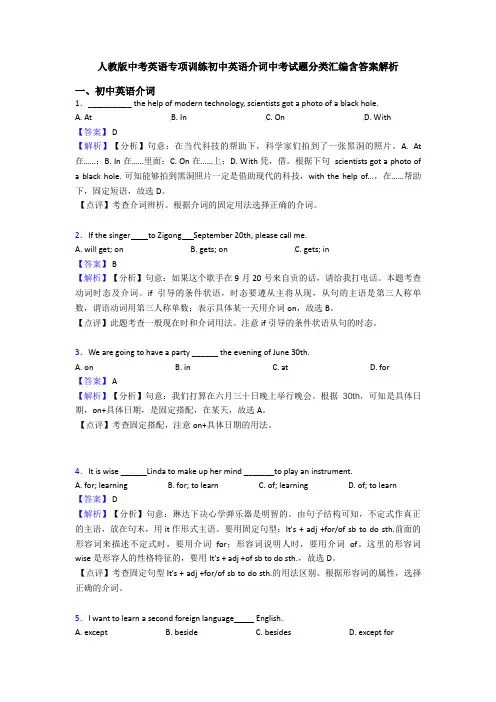
人教版中考英语专项训练初中英语介词中考试题分类汇编含答案解析一、初中英语介词1.__________ the help of modern technology, scientists got a photo of a black hole.A. AtB. InC. OnD. With【答案】 D【解析】【分析】句意:在当代科技的帮助下,科学家们拍到了一张黑洞的照片。
A. At 在……;B. In在……里面;C. On在……上;D. With凭,借。
根据下句 scientists got a photo of a black hole. 可知能够拍到黑洞照片一定是借助现代的科技,with the help of...,在……帮助下,固定短语,故选D。
【点评】考查介词辨析。
根据介词的固定用法选择正确的介词。
2.If the singer to Zigong September 20th, please call me.A. will get; onB. gets; onC. gets; in【答案】 B【解析】【分析】句意:如果这个歌手在9月20号来自贡的话,请给我打电话。
本题考查动词时态及介词。
if 引导的条件状语,时态要遵从主将从现,从句的主语是第三人称单数,谓语动词用第三人称单数;表示具体某一天用介词on,故选B。
【点评】此题考查一般现在时和介词用法。
注意if引导的条件状语从句的时态。
3.We are going to have a party ______ the evening of June 30th.A. onB. inC. atD. for【答案】 A【解析】【分析】句意:我们打算在六月三十日晚上举行晚会。
根据30th,可知是具体日期,on+具体日期,是固定搭配,在某天,故选A。
【点评】考查固定搭配,注意on+具体日期的用法。
4.It is wise ______Linda to make up her mind _______to play an instrument.A. for; learningB. for; to learnC. of; learningD. of; to learn【答案】 D【解析】【分析】句意:琳达下决心学弹乐器是明智的。
人教版中考英语复习专题介词知识点总结
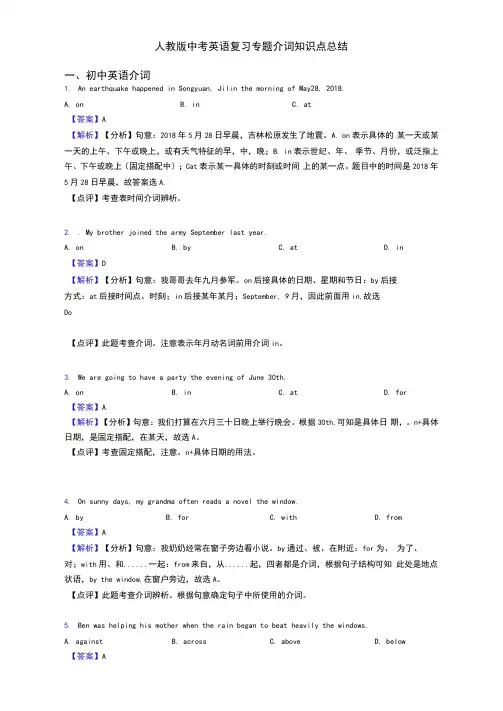
人教版中考英语复习专题介词知识点总结一、初中英语介词1.An earthquake happened in Songyuan, Jilin the morning of May28, 2018.A. onB. inC. at【答案】A【解析】【分析】句意:2018年5月28日早晨,吉林松原发生了地震。
A. on表示具体的某一天或某一天的上午、下午或晚上,或有天气特征的早,中,晚;B. in表示世纪、年、季节、月份,或泛指上午、下午或晚上(固定搭配中);Cat表示某一具体的时刻或时间上的某一点。
题目中的时间是2018年5月28日早晨,故答案选A.【点评】考查表时间介词辨析。
2.. My brother joined the army September last year.A. onB. byC. atD. in【答案】D【解析】【分析】句意:我哥哥去年九月参军。
on后接具体的日期、星期和节日:by后接方式:at后接时间点、时刻;in后接某年某月;September, 9月,因此前面用in,故选Do【点评】此题考查介词。
注意表示年月动名词前用介词in。
3.We are going to have a party the evening of June 30th.A. onB. inC. atD. for【答案】A【解析】【分析】句意:我们打算在六月三十日晚上举行晚会。
根据30th,可知是具体日期,。
n+具体日期,是固定搭配,在某天,故选A。
【点评】考查固定搭配,注意。
n+具体日期的用法。
4.On sunny days, my grandma often reads a novel the window.A. byB. forC. withD. from【答案】A【解析】【分析】句意:我奶奶经常在窗子旁边看小说。
by通过、被、在附近:for为、为了、对;with用、和......一起:from来自,从......起,四者都是介词,根据句子结构可知此处是地点状语,by the window,在窗户旁边,故选A。
(完整版)初中英语语法介词用法讲解与练习
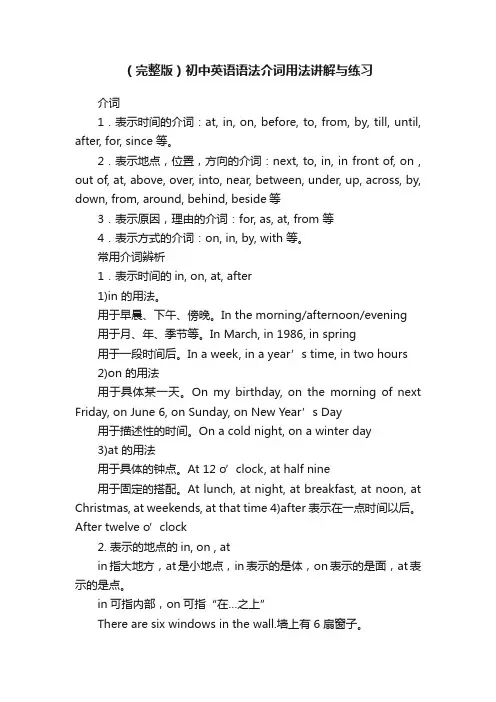
(完整版)初中英语语法介词用法讲解与练习介词1.表示时间的介词:at, in, on, before, to, from, by, till, until, after, for, since 等。
2.表示地点,位置,方向的介词:next, to, in, in front of, on , out of, at, above, over, into, near, between, under, up, across, by, down, from, around, behind, beside等3.表示原因,理由的介词:for, as, at, from 等4.表示方式的介词:on, in, by, with 等。
常用介词辨析1.表示时间的in, on, at, after1)in 的用法。
用于早晨、下午、傍晚。
In the morning/afternoon/evening用于月、年、季节等。
In March, in 1986, in spring用于一段时间后。
In a week, in a year’s time, in two hours2)on 的用法用于具体某一天。
On my birthday, on the morning of next Friday, on June 6, on Sunday, on New Year’s Day用于描述性的时间。
On a cold night, on a winter day3)at 的用法用于具体的钟点。
At 12 o’clock, at half nine用于固定的搭配。
At lunch, at night, at breakfast, at noon, at Christmas, at weekends, at that time 4)after 表示在一点时间以后。
After twelve o’clock2. 表示的地点的in, on , atin指大地方,at是小地点,in表示的是体,on表示的是面,at表示的是点。
人教版中考英语中考英语总复习 初中英语介词X知识点总结复习及练习测试题含答案解析
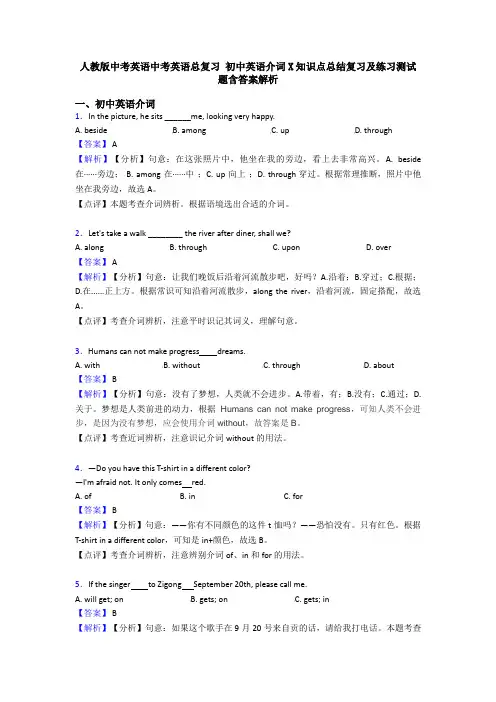
人教版中考英语中考英语总复习初中英语介词X知识点总结复习及练习测试题含答案解析一、初中英语介词1.In the picture, he sits ______me, looking very happy.A. besideB. amongC. upD. through【答案】 A【解析】【分析】句意:在这张照片中,他坐在我的旁边,看上去非常高兴。
A. beside 在······旁边; B. among 在······中;C. up 向上;D. through穿过。
根据常理推断,照片中他坐在我旁边,故选A。
【点评】本题考查介词辨析。
根据语境选出合适的介词。
2.Let's take a walk ________ the river after diner, shall we?A. alongB. throughC. uponD. over【答案】 A【解析】【分析】句意:让我们晚饭后沿着河流散步吧,好吗?A.沿着;B.穿过;C.根据;D.在......正上方。
根据常识可知沿着河流散步,along the river,沿着河流,固定搭配,故选A。
【点评】考查介词辨析,注意平时识记其词义,理解句意。
3.Humans can not make progress dreams.A. withB. withoutC. throughD. about【答案】 B【解析】【分析】句意:没有了梦想,人类就不会进步。
A.带着,有;B.没有;C.通过;D.关于。
梦想是人类前进的动力,根据Humans can not make progress,可知人类不会进步,是因为没有梦想,应会使用介词without,故答案是B。
【点评】考查近词辨析,注意识记介词without的用法。
4.—Do you have this T-shirt in a different color?—I'm afraid not. It only comes red.A. ofB. inC. for【答案】 B【解析】【分析】句意:——你有不同颜色的这件t恤吗?——恐怕没有。
人教版英语九年级全册Unit1介词by用法精讲练
介词by用法精讲练一、用法详解1. 表示场所,意为“在……旁边”“在……近旁”“在……手边”,此时要注意它与介词near有所不同,即by 表示的距离更“近”。
比较:He lives by the sea. 他住在海滨。
He lives near the sea. 他住在离海不远处。
2. 表示动词执行者,主要用于被动语态,此时要注意它与介词with的区别:by 表示动作的主体,with 表示动作者的手段工具。
如:The house was destroyed by fire. 此屋被大火烧毁。
(fire是动作的主体,此句的主动形式为Fire destroyed the house.)The house was destroyed with fire. 此屋是(被人)用火烧毁的。
(fire只是工具,动作的主体另有其人,此句可认为省略了一个by短语,如by someone之类的,其主动形式可以是Someone destroyed the house with fire.),3. 表示手段或方式等,注意以下用法:(1) 表示“乘”“坐”时,其后接交通工具(如bus, bike, train, plane, car, taxi, ship 等)或与交通工具密切相关的名词(如air, water, land, road等),在句中主要用作方式状语,其中通常不用冠词或其他限定词。
如:They came here by the first bus. 他们是坐第一班车来的。
但是,若表示交通工具的名词前插有定语修饰语,则也可以用冠词。
如:We’re going by the 9:30 train. 我们坐9:30的火车去。
We went to Shanghai by a large ship. 我们乘一艘大船去上海。
注意,汉语说“步行”,英语习惯上用on foot, 而不用by foot。
(2) 注意以下表示方式的有用表达,其中不用冠词或其他限定词:|by phone 用电话by telegram 用电报by letter 用信件by express 用快件by air mail 用航空邮件by ordinary mail 用平信by post 用邮寄by radio 用无线电by hand 用手工by machine 用机器二、典例分析1.(2013·重庆中考)You can improve your English_____ practicing more.A. byB. withC. ofD. in,【解析】考查介词的用法。
人教版中考英语九年级英语 介词技巧全解及练习题(含答案)
人教版中考英语九年级英语必备英语介词技巧全解及练习题(含答案) 一、初中英语介词1.Look at the picture on the right! She is going _______.A. into the libraryB. out of the post officeC. into the supermarket【答案】C【解析】【分析】句意:看右边的图画!她要去超级市场。
A. into the library进图书馆;B. out of the post office走出邮局;C. into the supermarket进超市。
根据右边的图片可以看到这名妇女正要走进超市,结合选项,故答案为C。
【点评】考查图片辨析。
看懂图片,理解题意,注意熟记表示地点的名词。
2.I'll be at home __________ Sunday morning. You can phone me then.A. onB. inC. atD. to【答案】 A【解析】【分析】句意:在周日早上我将在家,那时你可以给我打电话。
on+具体时间;in+the+morning/afternoon/evening,在早上/下午/晚上;at+时间点。
Sunday morning指的是周日早上,指的是具体日期,所以用on,故选A。
【点评】考查介词辨析,注意平时识记on、in、at的区别。
3.I will go around the city of Dalian by light-rail vehicle(轻轨) subway because I haven't taken it before.A. instead ofB. in the face ofC. along withD. across from【答案】 A【解析】【分析】句意:我打算不坐地铁,坐轻轨车参观大连,因为我以前从没有坐过。
A.而不是;B.面对;C.和……一起;D.在……对面。
初中英语语法基础——介词专题讲解 (附同步练习试题)
初中英语语法基础介词专题讲解一.介词at/ in /on .1.表示时间:1).表示某一具体时间点,某一时刻/ 年龄at six o’clock at noon at that timeat the moment at the age of at night2)in表示时间段,一天的三个时间段以及月份,年,季节,世纪,人生的某个时期(某人几十岁时)in the morning/afternoon /eveningin spring /in 2007/in Marchin the twenty-first centuryin his fifties3)on表示星期几/某一具体的日子/具体某天的上午/下午/晚上,表示一天中的三个时间段名词前有修饰语或后有修饰语时.On Monday on New Year’s Dayon Sunday morning on a rainy nighton the evening of April 1st ,20072表地点:1)at 一般指较小的地点或较具体的位置at the station at the cinema2)in 表示在较大的地点或一个有限空间里.in China in the classroom3)on 指在某物体的表面上.on the desk注意:写街道时,若有门牌号用at ,否则用on / in 都可.He lives at 270 DongChang’an Street.二.介词in /on / to 表方位:1.in表示A地在B地范围之内.(包含关系)Tanwan is ____ the southeast of China .2.on表示A,B地接壤.(外切关系)Hubei is ____ the north of Hunan .3.to表示A,B两地有一定的间距.(外离关系)Japan is _____ the east of China .三. between / among 在……之间1.between :指两者之间. 在…….之间.2.among :用于三者或三者以上人或物之间. 在……之中.You sit _____ him and me .The song is popular ______ the students.四.after / in 在……之后 before / in 在……之前1. after1)after + 时间段. 表示以过去某一时刻为起点的一段时间之后, 用于过去时.2)after 作介词. after doing sth.2.in +一段时间. 表示说话时或以现在为起点的将来一段时间之后.用于将来时.He came back ______ two days .He will go home___finishing his homework .He will come back _____ two days .3. before 多用于时间点或一件事之前发生,即“先于……;在……之前”He left the office bofore I got there. I’ll be back before five o’clock.4. ago 时间段+ ago 表示“多久之前”时态通常用:一般过去时I met Tom two days ago.五.with / in / by 表示“用……”1.with 表示“用…” 一般指有形的工具/ 手段/ 人体器官.He cut the apple into halves ____ a knife .注: with 表伴随, “带有,含有”He came in _____ a big smile on his face .2.in表示用某种语言,方式,途径. 或书写/绘画所用的材料. 也可表交通方式.Can you say it _____English ?He wrote a letter ____ blue ink .3.by表示乘坐交通工具, 表示方式,方法I study for a test _____ working with a group .He makes a living ____ selling newspapers .注意: 同义词组1).by phone = on the phone2).by car = in a car3).in pen = with a pen = with pens六.across / through / over / by 经过1.across 指横穿,穿过. 表示动作从某一物体表面上经过.2.through 指穿过,透过,表示从某一物体空间内通过.3.over 表示从某人或某物的上空经过或越过,不与表面接触.4.by 表示从某人/某物的旁边经过.Can you swim ______ the river ?the elephant is so big that it can’t go _____ the gate .I don’t think anyone can jump ___ the fenc e.I walked _____ the bank of China yesterday .七.in front of / in the front of1.in the front of 表示在…….内部的前面2.in front of 表示在……外面的前面There is a desk in _____ front of our classroom .There is a big tree in _____ front of our classroom.八.其它介词的用法:1.at的其它用法.1).表示“从事或正在做某事”,其后加的名词往往不加冠词.She is at work now = She is working now .2)at表示“价格或速度”The train ran at 120 kilometers an hour .2.in的其它用法:1)in表示“在……方面”词组:do well in = be good atbe weak in2)in 表示“穿着”后接表颜色的词或衣服.词组: be in +衣服= be wearing +衣服3)in作副词, “在家” = at home3.like 的用法:1).像/和……一样. 常与系动词连用.词组: look like sound like2).与what 连用, “是什么样子, 怎样”.What is he like ? He is kind .4.off的用法:1).从……下来, 脱离某物体.词组: fall off2). “休假”通常放在时间名词之后.词组: have +时间+ offHe has n’t had a night off for two hours .5.except / besides1).except 除了…….之外, 都……. . 不包括在范围之内.注: nothing but … 除了……之外,什么也没有.2).besides除了……之外,还有…… . 包括在范围之内.We all went swimming ______ Lucy .There is _______ a letter in the box .We study Japanese and French____ English .6.with / without1).with具有,含有反义词: without 没有词组: with the help of = with one’s help =because of = thanks towithout one’s help2).without 的用法:A).without + sb./ sth. 没有某人或某物B).without + doing sth . He lef t here without____(say ) “Goodbye”to usC). without sth 常与if 引导的否定的条件句.If there is no water , we can’t live .= We can’t live ______ _______ .7.on the tree /in the treeon the tree 表示“树上本身长的东西” 在树上.in the tree 表示“外界的物体进入树中” 人或物在树上.There are some apples _____ the tree .There is a boy ____ the tree.8.表示“数量的介词”about , round around , over1). about , round around表示“大约……”2).over 表示“超过”= more than.9.inside / outsideInside 在……里面------反义词:outside在….外面10.in the wall /on the wallin the wall 表示“门窗在墙上” on the wall 表示“某东西张贴或挂在墙上”九.不用介词的情况:1).当时间状语为: tonight, today, yesterday, tomorrow 等时,不用介词. What are you going to do tonight ?2).含有this, that, these, those, last, next, every/each day等时间状语.He went to Wuhan last week . I drink milk every day.3).以all 开头的时间状语前面不用介词.He has worked all day .4).以some ,any, one 等构成的时间状语前不用介词.He met a bad man one cold morning. = He met a bad man on a cold morning.介词专题小测:一、单项选择题。
(完整版)初中介词和介词短语专题讲解(含练习)
介词及介词短语【考点直击】1.常用介词及其词组的主要用法及意义2.介词表示时间、方位、方式别的基本用法3.一些易混介词的辨析【语法讲解】◆介词的功能介词是一种虚词,用来表示名词或相当于名词的其它词语句中其它词的关系,不能单独使用。
介词可与名词或相当于名词的其它词构成介词短语.介词短语可在句中作定语,状语,表语和宾语补足语。
例如:The boy over there is John’s brother。
(定语)The girl will be back in two hours. (状语)◆介词和种类(1)简单介词,常用的有at, in, on, about, across,before,beside, for , to, without 等。
(2)复合介词,如by means of, along with,because of, in front of, instead of等.◆不同介词的用法(1)表时间的介词1)at,in on表示时间点用at.例如:at six o’clock, at noon, at midnight。
表示在某个世纪,某年,某月,某个季节以及早晨,上午,下午,晚上时,用in.例如:in the nineteenth century, in 2002, in may, in winter, in the morning,in the afternoon等。
表示具体的某一天和某一天的上午,下午,晚上时,用on。
例如:on Monday, on July 1st, on Sunday morning等。
2)since,after由since和after 引导的词组都可表示从过去某一点开始的时段,但since词组表示的时段一直延续到说话的时刻,因而往往要与现在完成时连用。
而after词组所表示的时段纯系过去,因而要与一般过去时连用。
例如:I haven’t heard from him since last summer.After five days the boy came back。
- 1、下载文档前请自行甄别文档内容的完整性,平台不提供额外的编辑、内容补充、找答案等附加服务。
- 2、"仅部分预览"的文档,不可在线预览部分如存在完整性等问题,可反馈申请退款(可完整预览的文档不适用该条件!)。
- 3、如文档侵犯您的权益,请联系客服反馈,我们会尽快为您处理(人工客服工作时间:9:00-18:30)。
一.介词的含义介词是一种虚词,用来表示名词或相当于名词的其它词语与句中其它词的关系,不能单独使用。
介词可以与名词或相当于名词的其它词构成介词短语。
二.表示时间的介词at (表示钟点): at 6:30 固定搭配: at noon ; at night ; at present / atthe momentin (表示年代/月份/季节): in July; in 2006; in September,1998 ; in spring固定搭配: in the morning / in the afternoon / in theeveningon (表示具体日期: 某月某日/星期几): on Monday ; on Sunday morning ; on December17before在 --- 之前after 在--之后by在--之前(时间);到--为止until / till : 直到 --(时间)since自从 -- 以来for(接一段时间)during 在 -- 期间from 从--时起in + 一段时间: --以后(用于将来时)within --之内after+ 一段时间:--以后(用于过去时) beyond --之外三.表示场所,方向的介词at 在某处(小地方)(at the cinema; at school; at home; at the railway station)in 在某处(大地方)(in China; in Beijing);在--里面(in the classroom; in thewater)on 在--上面(紧贴着其表面): (on the table; on one’s face)near 在---附近 beside:在--旁边by 在--旁边between在--和--之间among在--(3者或更多的人或物)当中in front of 在--的前面behind 在--的后面 beside: 在—旁边into 进入--里out of 从--中出来 near / nest to 靠近across穿过(沿着表面)through穿过(从中间)along 沿着from -- to -- 从--到-- around 在--周围over 在--的正上方under在--的正下面/ above 在--斜上方below 在--斜下方四.其他介词in 用(某种语言),穿着(某种颜色的衣服)about大约;关于 from 来自 --- as像--(接句子);正如--; like 像--(接单词)with和--起;用-- without 没有-- by通过(某种方式或手段);乘坐by bus(train /plane /ship /bike)on foot五.重要介词辨析(1)on, over与aboveOn 在……上面与物体表面有接触面Over 在……上方垂直正上方,表示“跨越,覆盖”Above在……上方“在……(偏)上方”,表示两者不接触例如:There is a bag on the desk.The lamp is over the table.The heaven is above us.(苍天在上。
)(2)in, on 与toin 用于主语被包含于某一范围之内。
on 用于表示两地互相接壤。
to 用于主语在某一范围之外。
例如:Beijing lies in the north of China.北京位于中国的北部。
Rusia is on the north of China.俄罗斯在中国的北面。
Japan is to the east of China.日本在中国的东面。
(3)across, over, through 与pastacross “穿过”强调从物体表面的这一边到另一边over “越过”强调从人或事物的上方经过,越过through “穿过,通过”强调从物体内部穿过;从长形物的一头到另一头。
past “经过”只从物体旁边经过例如:If you see the green light, you can walk across the street.The train run through the tunnel(隧道).I can jump over the fence(围墙).We walked past the hospital.(4) except, except for, besides与butexcept “除……以外”表示同类事物之间的关系except for “除……以外”,“如果不是”,“若非”表示对局部的否定,不表示同类事物之间的关系besides “除……以外”,“还有……”所指事物包括在叙述范围之内but “除……以外”多与nobody, none, no one, nothing, anything, everyone, all, who连用例如:We all went swimming except Ann.Besides Ann, we all went swimming.Your composition is good except for some spelling mistakes.No one but Peter went there.(5) in front of 与in the front of “在……前面”in front of 指一个物体在另一个物体的前方in the front of 指一个物体包含在另一个物体内部的前方There is a big tree in front of the classroom.There is a desk in the front of the classroom.(6) since 与forsince “自从……”后跟时间点或动作初始的句子,用于现在完成时态。
for “达,计……”后跟时间段,用于现在完成时态。
例如:I have learned English since 2002.We have known each other since I was a little boy.They have lived here for ten years.介词专项训练1. Mary is flying to Italy. She will arrive Paris the morningof July 9.A. at / inB. in / onC. in / inD. at / on 2. China lies the east of Asia and the north of Australia.A. to / toB. to / inC. in / onD. in / to 3. -- What time did you get there this morning ? -- eight.A. InB. OnC. AtD. From 4. the help of Liu Tao, I have made much progress in English recently.A. UnderB. InC. WithD. On 5. Last night I did my homework 11 o’clcok, so I got up late thismorhing.A. untilB. atC. fromD. in 6. I’ll return back to Qingdao a few days.A. sinceB. inC. onD. after7.I prefer coffee tea, and so I often drink coffee insteadtea.A. from / toB. with / atC. to / ofD. for / of 8. We can’t live air or water.A. withB. out ofC. inD. without9. When Li Ming talks to foreigners, he always thinks Chinese first, then he turns her words English.A. by / toB. in / intoC. with / intoD. through/ to10.Qingdao is famous Qingdao Beer and Zhanqiao Pier.A. forB. asC. toD. with11.It’s impolite to laugh someone who makes mistakes.A. toB. onC. atD. into 12.Finally I came up a good idea to solve the problem.A. withB. toC. atD. on 13.-- Is this car yours ?-- No, it’s not mine. It belongs Peter.A. withB. toC. inD. at14.May 4 Square and Zhanqiao Pier are regarded the symbol of Qingdao.A. toB. onC. inD. as 15.Great changes have taken place in Qingdao 2008.A. afterB. beforeC. sinceD. for16.We always provide the customers a good after-sale service.A. forB. withC. toD. from17.My mobile phone is different yours.A. fromB. toC. atD. in18.This method is not suitable me. I’ll think about other ones.A. toB. atC. forD. with19.I have been working three hours, so I feel a bit tired.A. afterB. inC. sinceD. for20.Fruits watermelon are very popular in summer.A. asB. likeC. forD. with 21.I paid 3000 yuan the computer.A. forB. toC. onD. in22. the end, we decided to go to the zoo together the next Sunday.A. AtB. InC. OnD. With 23.I always go home Wei Hua school.A. after / atB. to / beforeC. with / afterD. without/ from24. the time I arrived the railway station, the train hadalready left.A. At / toB. In / intoC. After / onD. By / at 25.Tom often make some mistakes because his carelessness.A. ofB. offC. toD. at 26.-- Would you like some coffee ?-- Yes, please. By the way, do you have any milk ? I prefer coffee milk.A. fromB. withC. toD. for27. I didn’t go to bed last night I finished my homework.A. atB. fromC. inD. until28.I usually go to school foot because my home is not far myschool.A. by / toB. by / awayC. on / fromD. on / for 29.Mr Smith left the office saying anything.A. withB. withoutC. withinD. after 30.A bird flew into the house the window.A. throughB. acrossC. fromD. behind 31. the night of August 8, 2008, the Opening Ceremony of the 29th Olympic Games was held in Beijing.A. InB. OnC. ForD. At 32.Linda always spends too much money clothes.A. forB. inC. onD. with 33.Your backpack is similar mine.A. toB. withC. forD. about 34.I will go to Hangzhou two weeks.A. forB. inC. afterD. with35.My father is always busy his work.A. withB. onC. inD. for36.It is usually cold winter the north of China.A. on / atB. at / onC. in / inD. at / at 37.Mr Brown came to China July, 2005.A. onB. inC. atD. since 38.Thanks your help, I’ve made great progress in English.A. toB. forC. ofD. X39.The buses are always crowded people.A. ofB. forC. amongD. with 40.Chen Fei is learning Japanese the moment. She will leave Japan next year.A. in / toB. for / withC. at / forD. on / at 41.Whether we will go to the zoo tomorrow depends the weather.A. onB. forC. atD. in42.It’s very kind you to come to see me .A. for / ofB. of / offC. with / offD. to / with43.It is very necessary us to learn English. It is the most widely-usedlanguagethe world.A. for / inB. of / atC. to / onD. with /around44.I have been living here more than 20 years.A. sinceB. forC. afterD. before 45.The man the left is Jenny. He is talking Paul over there.A. in / aboutB. to / withC. on / toD. at / about 46.Can you swim the river ?A. overB. throughC. underD. across 47.We should stand line when we are waiting a bus.A. on / inB. in / forC. in / onD. on / for 48.Japan is the east of China, and India is the west of China.A. to / onB. on / inC. in / onD. on / to 49.I worked the problem accident.A. up / inB. with / atC. out / byD. in / with 50.It is nearly 10 pm, but Tom still didn’t come home, and so his mother is veryworriedhim.A. forB. aboutC. withD. on 51.Chinese people like drinking tea nothing in it.A. withB. inC. onD. for52.A new railway was built the two cities.A. alongB. inC. betweenD. among 53.Chen Ming does well his lessons and he is good playingfootball.A. with / inB. in / atC. at / withD. of / at 54.The girl a blue dress is my classmate Lily.A. withB. onC. atD. in55.I usually have some bread and a glass of milk breakfast.A. forB. atC. onD. in56.It’s not necessary to look every new word the dictionary while reading.A. for / fromB. at / atC. after / inD. up / in 57.Please make a sentence the new word you have just learned.A. withB. withoutC. inD. of 58.There is a park the post office.A. insideB. overC. in front ofD. in thefront of59.It is said that this kind of paper is made wood and it is made Canada.A. of / atB. from / inC. out of / inD. with / from 60.I like classical music instead pop music.A. atB. aboutC. onD. ofBDCCA BCDBA CABDC BACDB ABCDA BDCBA BCABA CBADC ABABC DBACB ACBDA DACBD。
